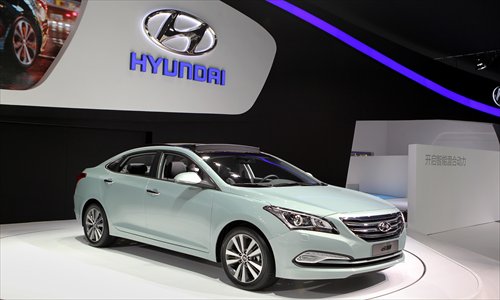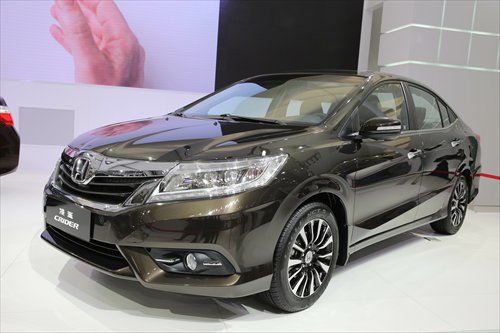HOME >> BUSINESS
Hyundai Motor feels heat from Japanese rivals in China
Source:Reuters-Global Times Published: 2013-12-6 5:03:02

A Hyundai Mistra is displayed during the 11th China (Guangzhou) International Automobile Exhibition on November 21. Photo: IC
Hyundai Motor Co could be one of the biggest losers from surging sales of Japanese cars in China as the South Korean automaker's problems spread from the US to the world's largest auto market.
Hyundai's total overseas vehicle sales fell 1 percent in November from a year earlier, the company said Monday, marking their first year-on-year drop since the 2009 financial crisis and sending Hyundai shares tumbling.
Japanese carmakers meanwhile are going from strength to strength thanks to the launch of new models, the weaker yen in the US and an end to anti-Japan protests that played havoc with China sales last year.
In the 11th China(Guangzhou)International Automobile Exhibition that closed last weekend, Toyota launched three new models dedicated to appeal to the Chinese consumers. Another Japanese auto brand Honda also unveiled new models at the auto show to gain back the attention of Chinese consumers.

Guangqi Honda's Crider Photo: IC
Japanese sales up
Major Japanese automakers have reported sales growth of over 80 percent in October, according to statistics from the China Association of Automobile Manufacturers, though partly due to a low base number last year.
In November, Toyota Motor Corp and its two local joint-venture partners saw China sales jump 41 percent from a year earlier, while Honda Motor Co posted a 102 percent jump in China sales in the same period.
Nissan Motor Co and its local joint-venture sold 131,800 automobiles in China in November, up 95.7 percent from a year earlier, the Japanese automaker said Tuesday.
That follows a 128 percent year-on-year jump in October and an 83 percent increase in September.
Another major Japanese auto brand Honda Motor Co and its two local joint ventures sold 83,013 automobiles in China in November, up 101.5 percent from a year earlier, the Japanese automaker said Tuesday.
That follows a 211.6 percent year-on-year jump in October and a 118 percent rise in September.
Honda's gain follows a 211.6 percent year-on-year rise in October and a 118 percent surge in September.
"Japanese carmakers, which boosted US profits with the weaker yen, have more room to invest in China sales where they lag behind rivals," said Song Sun-jae, an auto analyst at Hana Daetoo Securities. "For Hyundai, the China effect disappeared in November while the US sales remain sluggish."
Shares in Hyundai Motor and its affiliate Kia Motors, which together rank fifth in global auto sales, ended down 4.2 percent and 5.2 percent on Tuesday, respectively, hurt by weak November sales and as the yen skidded to a more than six-month low against the US dollar. The Korea Composite Stock Price Index closed 1.1 percent lower.
China strategy, US strains
Hyundai's new plant in Beijing, which went into production last year, has helped to offset stagnating demand in the US. Even so, China sales rose only 1 percent in November from a year earlier.
The plant, Hyundai's third in China, has capacity to produce 300,000 vehicles and the company plans to increase this to 450,000 next year.
Hyundai is considering building a fourth plant in China to maintain its market share of around 10 percent in 2015 and 2016, when the Chinese market is expected to grow to 20 million vehicles a year.
But the timing of any new plant has not been announced and group chairman Chung Mong-koo remains wary of major capacity expansion, a person familiar with the matter said earlier this year.
In the US, Hyundai is certain to miss its annual sales target for the first time in recent years, as January-November sales rose just 2 percent.
Banking on sedans
Hyundai is betting that its new Genesis and Sonata sedans will lift sales by 10 percent next year, although analysts say capacity constraints and rising competition will keep sales under pressure.
Hyundai's reputation took a hit in the US market in November after it admitted it had overstated the fuel economy of more than 1 million vehicles in North America.
"The currency environment has been dramatically changed and competition has been cut-throat," Ryu Yen-wha, an analyst at IM Investment & Securities.
"My view is that the upcoming Genesis and Sonata will not have as much impact as they did in the past, because of the lack of innovations in design and powertrain," he said.
Hyundai and Kia were the only major South Korean carmakers to suffer falls in domestic sales in November, as they struggled to fend off competition from smaller rivals and imported cars.
South Korean sales slumped 12 percent in November from a year earlier, Hyundai said. Kia's domestic sales fell 12 percent, while its overseas sales inched up 2 percent.
Reuters - Global Times